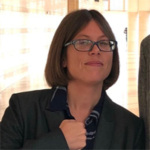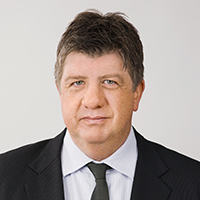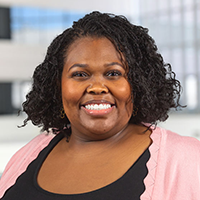Trial by Media? The Free Press and the Criminal Justice System
In today’s fast-moving information landscape, journalists play a critical role in uncovering the truth. While social media has opened doors for reporters to reach wider audiences with accessible content, these platforms create additional challenges in the dissemination of credible information.
 Ahead of World Press Freedom Day on May 3, the News Literacy Project hosted a conversation with reporter Meghann Cuniff, a longtime legal affairs journalist, about researching and reporting high-profile legal proceedings, including the role of social media in covering cases involving celebrities like Sean “Diddy” Combs and Megan Thee Stallion.
Ahead of World Press Freedom Day on May 3, the News Literacy Project hosted a conversation with reporter Meghann Cuniff, a longtime legal affairs journalist, about researching and reporting high-profile legal proceedings, including the role of social media in covering cases involving celebrities like Sean “Diddy” Combs and Megan Thee Stallion.
Preview Cuniff’s approach to uncovering events inside the courtroom below and pick up strategies for teaching students about the role of a free press. For more, view the webinar in full on edWeb.
🪄 Demystify high-profile news
Journalists like Cuniff transform complex events into comprehensible reports so the public can stay informed. To make the details of celebrity trials accessible, Cuniff often posts live updates on social media. The platforms create an “escape from the paywalled world of legal journalism,” she said. With this alternative to limited access to articles from legal journals, more people can gain an understanding of what is happening in the courtroom.
Cuniff’s role is especially important given the level of public interest, especially among young people, in high-profile, celebrity trials. With many eyes and ears on these proceedings, Cuniff knows she has a responsibility to ensure that her readers’ understanding of the case and of the legal system itself is shaped accurately.
“There are so many people paying attention to [celebrity cases], that it really shapes their view of the legal system. It’s crucial to provide some education there.”
🤳 Understand citizen journalism
With the decline of many traditional newsrooms around the country, citizen journalists, or individuals without formal journalism training who gather and share information on news events, have stepped onto the scene.
While citizen journalists may unlock information that would not have otherwise been widely available, their existence emphasizes the need to ask questions about the basis for a reported story, Cuniff said. Citizen journalists often are not trained in the standards or ethical practices of professional journalists.
News literacy skills like understanding standards of quality journalism and investigating the source help ensure that internet users can sort through credible reporting and avoid spreading falsehoods.
“It’s a good reminder about the need to educate people about news literacy, what you’re reading, what you’re consuming, and who’s using primary sources.”
💨 Take a breath
When reporting a trial, Cuniff may only have a ten-minute break in the action to post updates for readers. To ensure that she does not sacrifice accuracy in her mission to get breaking news out quickly, Cuniff has a simple practice: taking a deep breath and slowing down.
Cuniff prioritizes using her news judgment to get the basic, most important details out first, recognizing that the nuances of the story can come later, once they have been confirmed.
Just as Cuniff does when she is reporting breaking news, readers can follow the same practice of slowing down and pausing before sharing information online. Taking a few extra minutes to explore the source behind a claim and looking for confirmation from multiple sources goes a long way in curbing the spread of falsehoods.
“It’s all about trying to take a deep breath and to calm down and then focus on the basics.”

Do your students know their First Amendment Rights?
A core standard of news literacy involves acknowledging the importance of the First Amendment and a free press to an informed public. In “The First Amendment,” a FREE interactive lesson on the Checkology® virtual classroom, students learn why the First Amendment’s five rights and freedoms are vital to American democracy. Through case studies, they will weigh in on Supreme Court decisions in which these protections were challenged.
Trial by Media? The Free Press and the Criminal Justice System
Get an in-depth look at the work and impact of investigative reporters in the criminal justice space – and what students can learn from this fascinating field – during this free webinar for educators, presented by the News Literacy Project on edWeb.net.
Trial by Media? The Free Press and the Criminal Justice System
Wednesday, April 30, 2025
5 p.m. ET/2 p.m. PT
In today’s fast-moving information landscape, investigative journalism plays a critical role in uncovering the truth. Yet journalists face growing challenges and threats to press freedoms.
Join us for an engaging edWebinar – just in time to mark World Press Freedom Day on May 3, 2025 – about the work and impact of investigative reporters in the criminal justice space, and what students can learn from this fascinating field. During this conversation led by the NLP’s Brittney Smith and Jostin Grimes, we’ll explore how investigative journalists challenge perceptions and navigate misinformation.
Attendees will learn how this important domain of journalism sheds light on complex systems, including the criminal justice system. You’ll also get a hands-on look at the Checkology® virtual classroom, a free, digital learning platform that helps students develop essential news literacy skills.
You’ll leave with actionable strategies for equipping learners with the tools to think critically about the news and how it is reported and to understand the importance of press freedoms. Don’t miss this opportunity to engage your students with one of today’s most compelling topics!
This edWebinar will be of interest to middle and high school teachers, librarians, school leaders, district leaders, and education technology leaders. This event complements NLP’s “Spring Sprints” resources.
🎁 All attendees will be automatically entered into a drawing to win a care package of NLP goodies.
Don’t miss this unique opportunity – reserve your spot today!
(Can’t make it at this time but still interested? Register anyway, and we’ll email you the recording.)
Why press freedom matters: The case of Evan Gershkovich
Ellie Blanchard
On March 29, 2023, Wall Street Journal reporter Evan Gershkovich was working on an assignment in Russia when he was accused of espionage and arrested. More than a year later, Gershkovich is still wrongfully detained, despite his and the U.S. government’s denial of Russia’s allegations.
This high-profile case highlights the necessity of a free press. Without the standards-based reporting press freedoms enable, we risk the spread of misinformation, disinformation and declining trust in institutions. Paul Beckett, an assistant editor at the Journal who is also responsible for their efforts to secure Gershkovich’s release, recently joined the News Literacy Project to discuss the case. Here are some key takeaways from our conversation with him:
The effect on reporting in Russia
Concerned for their safety, most reporters from the United States left Russia after Gershkovich was detained. “Russia is now being covered by most of the major U.S. news organizations from Berlin, from Warsaw, from Dubai, from London,” Beckett said. Independent Russian journalists also fled the country, contributing further to a lack of trustworthy news coming from inside the country.
“We know there is no substitute for being on the ground and writing about what you are seeing.”
Recognizing reliable journalism
When journalists are not allowed to do their duty as truth-tellers, it becomes even more important for individuals to be able to recognize signs of credible reports. As a starting point, Beckett suggests looking for multiple sides to a story. Consider whether the information you see includes various angles that represent multiple stakeholders.
“You want to think you’ve heard from everybody. And if you haven’t heard from everybody, you have to ask yourself, ‘Why not?’”
How to support Gershkovich
As Beckett’s team and the U.S. government continue to work toward Gershkovich’s release, you can support their efforts. Beckett encourages sharing Gershkovich’s name widely. “If people talk about him, think about him, mention his name, talk about him over dinner, I just think all of it makes a difference,” he said. You can also show your support more directly by visiting wsj.com/evan for updates and resources, including how to send Gershkovich a letter of support in Moscow.
“That he’s not forgotten is very important in a practical sense for our ongoing efforts.”
🌱 For the classroom
Educators: To seamlessly incorporate discussions of Evan Gershkovich and press freedoms into your classroom, start with our free “Misinfo 101” course on the Checkology® virtual classroom. This preset sequence of lessons will help students identify and debunk misinformation. Checkology also includes a “Press Freedoms Around the World” lesson, which explores the state of press freedoms in 22 nations.
Why Press Freedom Matters: Exploring Evan Gershkovich’s Case
This free webinar for educators, presented by the News Literacy Project and hosted by edWeb, explores the importance of protecting press freedoms around the world.
Wednesday, May 1, 2024
5:00 PM ET
Join the News Literacy Project and The Wall Street Journal for an important conversation ahead of World Press Freedom Day (May 3).
Press freedoms, the legal and/or constitutional protections that journalists have in order to do their jobs, are fundamental to democracy. Without press freedoms and the standards-based reporting they enable, we risk the further spread of misinformation, disinformation, and declining trust in institutions.
In this edWebinar, we’ll look at a high-profile example of the denial of press freedoms: the case of Wall Street Journal reporter Evan Gershkovich, who was wrongfully detained in Russia last year on bogus charges of spying. Wall Street Journal Assistant Editor Paul Beckett, who leads the Journal’s efforts at securing Gershkovich’s release, will discuss the case with New Literacy Project’s Brittney Smith.
Topics to be covered include:
- How press freedoms impact newsgathering around the world
- Strategies for teaching about press freedoms, from a news literacy lens
- Best practices for teaching about standards-based journalism
- How to use journalistic practices to uncover and expose mis- and disinformation
Attendees will also learn about free News Literacy Project resources, including the Misinfo 101 course and classroom resources and the “Press Freedoms Around the World” lesson, offered on the News Literacy Project’s free Checkology®️ virtual classroom.
This edWebinar will be of interest to middle and high school teachers, librarians, and school and district leaders. There will be time for questions at the end of the presentation.
Don’t miss this unique opportunity – reserve your spot today!
(Can’t make it at this time but still interested? Register anyway, and we’ll email you the recording.)
About the speakers


She holds a bachelor’s degree in biological science from the University of Cincinnati and a master’s degree in teaching science to adolescents and young adults from Mount St. Joseph University. She is currently pursuing her doctorate in educational practice and innovation with a STEM focus at the University of South Carolina.